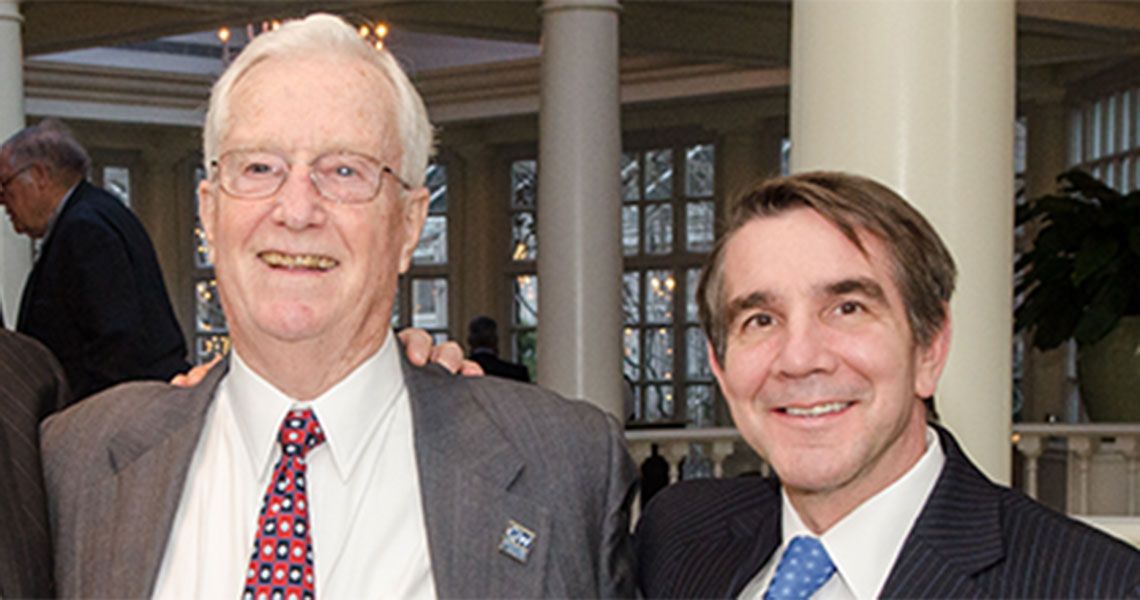Training residents is like having children, says Harry C. Miller, M.D. “You love them all, they are all different, some of them you like a little more than others, some you never hear from again, and then there are the residents who want to say hello and continue to learn from you.” It’s those residents that remind Miller, Professor Emeritus and former chair of the Department of Urology at the George Washington University School of Medicine and Health Sciences (SMHS), why he became a physician in the first place. To honor the man who led GW’s urology department for 22 years and recognize his courageous leadership, exceptional service, and substantial contributions to the department, SMHS hosted the inaugural Dr. Harry C. Miller Visiting Professorship, Symposium, and Reception, Feb. 22. “This is an incredible honor, one that I never expected,” said Miller, who arrived at GW in 1973. “It’s wonderful to catch up with people that I knew years ago and realize that all the residents we trained are successful and are making a significant impact in the field.”
Addressing SMHS alumni, staff, faculty, residents, and students, Thomas W. Jarrett, M.D., chair of the Department of Urology and professor of urology at SMHS, opened the day-long symposium by thanking them for their continued commitment and support to GW. “Harry was an incredible asset to our program,” said Jarret, who also described Miller as a superb physician who trained outstanding residents.
Medicine is a business of perfection, explained Miller. “I don’t want anyone operating on me who is not going to do a perfect job. There is no room for “almost” or my “B game,” he said. Most of his residents remember Miller as someone who would say, “Do it right this time.” They would respond by saying, “I did it right last time.” For Miller, nothing less than perfection would make the grade.
The game has changed, says Miller. “Advancements like robotic surgery to remove the prostate came into the picture as I was leaving,” he said. “It’s important to maintain the interest in finding out what’s happening now in the field.” Miller encouraged students to be curious and explore the fact that there might be a better way to do something.
During the discussion, Herbert Lepor, M.D., Martin Spatz Chairman of the Department of Urology and professor of pharmacology at the NYU School of Medicine, explained the latest advances in screening, detection, and treatment of prostate cancer. Lepor focused on the impact and limitations of the Prostate-Specific Antigen (PSA) test. Prostate cancer is the only malignancy that is diagnosed using a non-specific screening test that precipitates a random tissue sampling, explains Lepor. “Analyzing data over the years, there is a clear decrease in prostate cancer mortality due to screening,” he said.
Looking forward, Lepor believes “we need better tools to screen. Ideally we need to do a better job of appropriately selecting men with an elevated PSA for biopsy.” He added that biopsy sites should be targeted and not random, and highlighted the growing need to improve ability to risk stratify prostate cancer.
Switching gears, Ellen Shapiro, M.D., director of pediatric urology at the NYU Urology Associates and professor of urology at NYU Langone Medical Center, discussed the management of prenatally diagnosed hydronephrosis, which literally means “water inside the kidney.” It typically occurs when one kidney becomes swollen due to the failure of normal drainage of urine from the kidney to the bladder. It is the most common abnormality found on a prenatal ultrasound and it is reported in about one to five percent of all pregnancies, explains Shapiro. However, approximately half of all prenatally identified hydronephrosis is transient and of no clinical consequence, she added.
“What you work for in life is a creation of memories and the memories I have made with all the people in this room has greatly impacted the course of my career,” said Miller in his closing remarks. For Miller, working at GW was a great opportunity. “I absolutely loved it. I loved my patients, residents, and operating.”
For recent SMHS M.D. graduate Sioban Hartigan, a first-year urology resident at the University of Pennsylvania, this event was the perfect opportunity to reconnect with her former faculty members. “All visiting professor events are extremely educational. It’s great to have well-known experts in the field of urology talk about what’s new regarding, screenings, detection, and treatment.”



